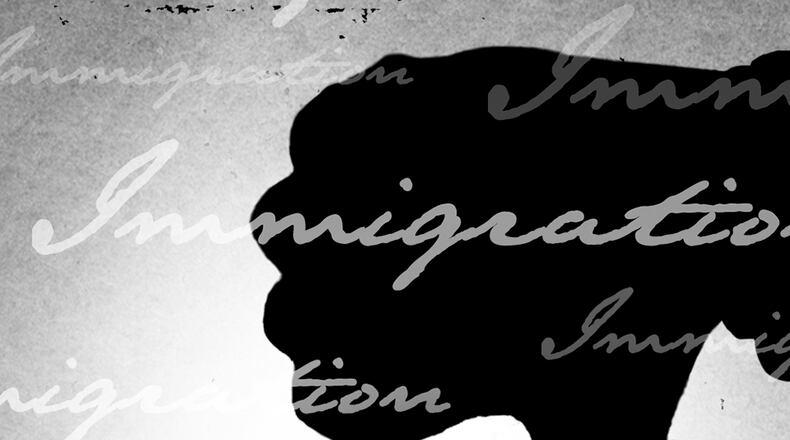Americans take their freedoms, social and financial, for granted. In a land of plenty, we’re all upset about something these days. Meanwhile, according to a recent U.S. Department of Homeland Security study, there are some 400,000 undocumented people in Georgia, in plain view yet invisible, largely migrant workers in landscaping, construction and agriculture, mostly Hispanic and from Mexico and Central America.
My experience with them comes from legal representation – I’m a Spanish-speaking gringo. My Colombian-born wife, with her education and awareness, strictly adhered to the immigration laws. Many of my criminal case clients, by contrast, cross the wastes into Texas or Arizona on foot – they tell me of encountering human bones in the desert. For various reasons repulsive to our sense of freedom, including overwhelming corruption and poverty, they are desperate to leave their countries.
Our state courts do a noble job of handling this incoming chaos. The undocumented, simple as their objectives typically are (to work, send money home and live a better life), tend to create chaos.
Credit: contributed
Credit: contributed
It’s not that they overburden the courts in Cobb, Cherokee, or Forsyth, the counties where I work. They hardly commit a majority of crimes – usually domestic violence or alcohol-related incidents – but a handful are dangerous. A few drug mules, but the scariest cartel stuff does not occur in Georgia. Gangbangers are usually young American citizens making that choice – migrants, on the other hand, have fewer options.
My courtrooms provide the same treatment to all. In my public defender work, in addition to our native crooks, I’m paid to represent the undocumented. Their distress sometimes stems from possible deportation, although not all crimes are deportable. For sure, the persistent ones tend to find a way back up here.
Truly, what sets the undocumented apart in the legal process is the sense of alienation, a cultural gap that can be seen as disruptive to the American idea of order. Their cases are no more difficult than those of our citizens, but the mismatch remains – all the more striking within the delicate balances of the justice system. Certainly, our interpreters well render English words into Spanish, but so many undocumented people stumble at the due process rights during a plea, not from resistance but from confusion over the concepts.
Years-long probated sentences are pronounced upon people and then made pointless by immediate deportation, especially in counties which hold them for immigration authorities to pick up. Unable to bond out without full cash payment (bail bondsmen don’t want a forfeiture), some finally plead out after months and months of waiting.
I try to anticipate the effects of a guilty plea on a client’s immigration status, but it seems to change over time. While the undocumented serve their sentence in prison before deportation for heavy crimes, misdemeanors don’t have clear outcomes. Will they be released directly from county? Or sent elsewhere and released? Or sent to an ICE detention center in South Georgia? For a hefty sum, an immigration lawyer might find grounds for federal relief, but that’s a long shot. Keep in mind, my clients tend to be uneducated and poor, surrounded by other undocumented people who can’t sponsor them.
Couple their background with their living conditions – no credentials means paying in cash, basically off the grid, as a rootless people. My efforts to investigate a crime can result in a dwelling’s residents scattering or hiding, even when I’m trying to help a family member. I’m sure it’s the same for the cops.
Be clear – I’m not shilling for anyone. Criminals are criminals, no matter what status. From my vantage point, our counties go to great lengths to protect the rights of folks already violating federal law. And most undocumented folks aren’t breaking state laws – they are toiling outside in the Georgia summer heat or at the chicken plant. As always, I’m willing to defend people in trouble.
Still, the problem of a culturally distinct and rootless people gnaws at the fabric of society. The federal government, in its division, has really dropped the ball. The last promising bill, the proposed Comprehensive Enforcement and Immigration Reform Act of 2007, a bipartisan effort under President George W. Bush, did not make it through Congress. The bill’s combination of an eventual path to citizenship and border enforcement is beyond us in today’s political climate, simply reinforcing the problem.
And it may be that any federal legislation to remedy all this is truly beyond us now. Ancient Rome in its growing disorder saw an influx of Germanic people, many soldiers, coming into the Empire, foreigners tasked with defending an order not their own. How are we so different? For so many of our undocumented people, in my experience, do want to belong here.
Doing justice by them at a local level might not move the ball at a higher level, but it is our best hope for now.
Douglas D. Ford is a commercial litigation and criminal defense attorney in metro Atlanta.
About the Author
Keep Reading
The Latest
Featured




